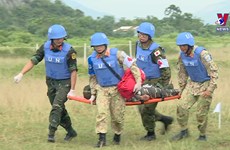Vietnam-Ireland viral lab starts operation
A Hanoi-based blood-borne viral testing laboratory, part of a cooperation
project between Vietnam and Ireland , was officially put into operation on March
17.
A Hanoi-based blood-borne viral testing laboratory, part of a cooperation
project between Vietnam and Ireland , was officially put into operation on March
17.
Conor Lenihan T.D, Ireland ’s Minister of State for Science, Technology and Innovation, said the state-of-the-art laboratory will contribute to raising Vietnam ’s capacity and infrastructure in viral diagnosis under the joint project conducted by the University College Dublin (UCD) and the National Institute of Hygiene and Epidemiology (NIHE) that started in 2007.
The four-year project capitalised at five million EUR is funded by the Government of Ireland and the Atlantic Philanthropies.
The project, also the first in health care cooperation between the two countries, will help Vietnamese scientists in their epidemiological research to combat and prevent new dangerous epidemics as well as the recurrence of contagious diseases such as SARS, A/H5N1, A/H1N1, HIV/AIDS and Hepatitis B, said Vietnamese Minister of Health Nguyen Quoc Trieu.
The incidence of and fatality of diseases caused by blood-borne viruses in Vietnam is rather high, said NIHE Director Nguyen Tran Hien, citing the HIV/AIDS rates of 25 percent and 4 percent respectively in drug users and prostitutes. The rate of Hepatitis B carriers in the country is also high, standing at 15-20 percent of the total population, added the Director./.
Conor Lenihan T.D, Ireland ’s Minister of State for Science, Technology and Innovation, said the state-of-the-art laboratory will contribute to raising Vietnam ’s capacity and infrastructure in viral diagnosis under the joint project conducted by the University College Dublin (UCD) and the National Institute of Hygiene and Epidemiology (NIHE) that started in 2007.
The four-year project capitalised at five million EUR is funded by the Government of Ireland and the Atlantic Philanthropies.
The project, also the first in health care cooperation between the two countries, will help Vietnamese scientists in their epidemiological research to combat and prevent new dangerous epidemics as well as the recurrence of contagious diseases such as SARS, A/H5N1, A/H1N1, HIV/AIDS and Hepatitis B, said Vietnamese Minister of Health Nguyen Quoc Trieu.
The incidence of and fatality of diseases caused by blood-borne viruses in Vietnam is rather high, said NIHE Director Nguyen Tran Hien, citing the HIV/AIDS rates of 25 percent and 4 percent respectively in drug users and prostitutes. The rate of Hepatitis B carriers in the country is also high, standing at 15-20 percent of the total population, added the Director./.













